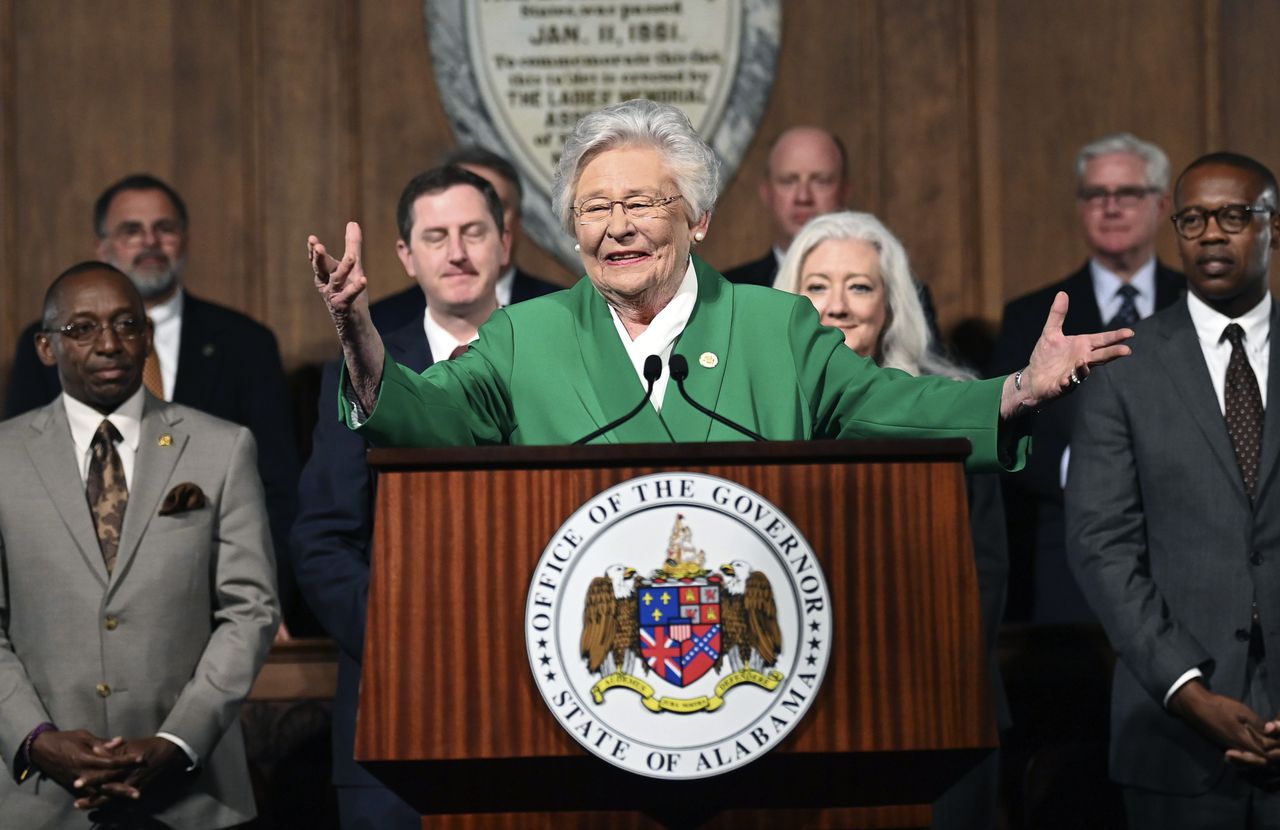Ivey proposes $400 rebates for Alabama taxpayers, millions for school facilities
Alabamians who filed taxes in 2021 can expect a $400 rebate in the next few months if Gov. Kay Ivey’s budget proposal makes it through the legislature.
“Just as every Alabama family budgets to invest, pay their debts and increase their savings, my budget proposals do just that for our state,” Ivey said in a news release. “From returning our taxpayers’ hard-earned dollars back to them to making historic investments in our students’ education, these budgets will help foster a strong Alabama today and a stronger Alabama tomorrow.”
Ivey released her proposals Tuesday for both the $2.8 billion supplemental appropriation and the 2024 education trust fund budget ahead of the re-start of the legislative session.
Related: Gov. Kay Ivey’s record budget request includes 2 percent pay raise for state employees
The $2.8 billion in unexpected revenue has been the subject of much discussion in recent months. The Legislature passed a $7.7 billion education budget for the last fiscal year, which ended Sept. 30, but the state raked in $10.4 billion in income taxes, sales taxes, and other revenues that support the Education Trust Fund.
The Governor’s proposal divides the proceeds into three major buckets: tax rebates, education, and other agencies included as part of the regular education budget process.
The tax rebates are expected to cost $966.8 million. Finance Director Bill Poole said taxpayers could have those rebates as early as 60 to 90 days after lawmakers approve the supplemental appropriation. In her State of the State address, Ivey said the one-time rebate of $400 would mean $800 in rebates for working families.
K-12 education
The Department of Education would receive $604 million for one-time K-12 expenditures, including:
- $360 million to cover increased costs of construction originally planned for in a 2020 state bond issue,
- $150 million for rural school systems in most need of capital improvements,
- $24 million for summer math camps required under the Numeracy Act,
- $25 million for the Saban Discovery Center,
- $10 million for startup costs for charter schools,
- $10 million for school safety grants,
- $10 million for college and career readiness grants,
- $10 million for the Teacher’s Liability Trust Fund,
- $5 million for Junior Achievement of Alabama.
Local boards of education would receive $59 million, of which $40 million would be given to school systems that were most in need of buses and $19 million would pay for the 2% raises for teachers and support personnel.
Higher education
Universities are also included in the supplemental appropriation, with most of the money earmarked for facility needs:
- $58.2 million for the University of Alabama at Tuscaloosa: $46 million for the Center for High Performance Computing and $6.4 million for a training center for electric vehicles,
- $58.2 million for the University of Alabama at Birmingham, including $50 million for emergency room expansion,
- $58.2 million for Auburn University, including $32.4 million for maintenance and capital expenditures, $20 million to complete the Brown-Kopel Lab,
- $36.9 million to the University of South Alabama,
- $33.5 million to Troy University,
- $19.3 million for the University of Alabama at Huntsville to build the Education and Advanced Training Complex,
- $17.7 million to Jacksonville State University of which $3 million is for campus and pedestrian safety and $8.3 million is for facility needs,
- $15.2 million to the University of North Alabama,
- $11 million to Alabama A&M University for facility needs,
- $11.2 million to Auburn University at Montgomery for facility needs,
- $10.6 million to the University of West Alabama,
- $8.4 million to Alabama State University for construction and maintenance,
- $7 million for Tuskegee University,
- $6.8 million for Athens State University, and
- $5.5 million for the University of Montevallo
The Alabama Community College System would receive $252.4 million of which $100 million must be used for prison education and $30 million for upgrading career tech facilities and equipment. The rest is for facility needs.
Other state agencies and entities
The Department of Economic and Community Affairs would receive $200 million for competitive grants for revitalization and development for rural areas through the Main Street Program
The Department of Commerce would receive $164.5 million, with the following money earmarked for special purposes:
- $31 million for the Mobile Airport Authority to relocate operation to the Mobile Downtown Airport,
- $25 million for the Port of Alabama for economic development and coal equipment,
- $25 million for the Montgomery County Commission for economic development,
- $30 million for an electric vehicle workforce training center,
- $5 million for the World Games,
- $8.5 million for the Challenger Learning Center,
- $12 million for the Lauderdale County Commission for a hydroelectric workforce training center,
- $10 million for the Alabama Site Development Fund which will provide grants through the State Industrial Development Authority,
Other items in Ivey’s supplemental appropriation proposal include:
- $59 million for reimburse PEEHIP (education employees’ health insurance program) for one-time COVID-related expenditures,
- $35 million for the Alabama Innovation Fund,
- $31 million for the new Alabama School of Healthcare Sciences in Demopolis,
- $20 million for the State Insurance Fund,
- $18.5 million to pay debt service on state bond issues,
- $4.1 million to fund pre-k classrooms in high-need areas of the state,
- $3 million to each of the three statewide magnet schools – Alabama School of Mathematics and Science, School of Cyber Technology and the School of Fine Arts for capital projects
- $2.3 million for the Department of Rehabilitation Services,
- $2 million for the Marine Environmental Science Consortium, and
- $2 million to the Alabama Space Science Exhibit Commission
Both of Ivey’s proposals must go through the regular legislative process, meaning both the Senate – where the education appropriations start this year – and the House must agree on how to spend the record amounts of money.
